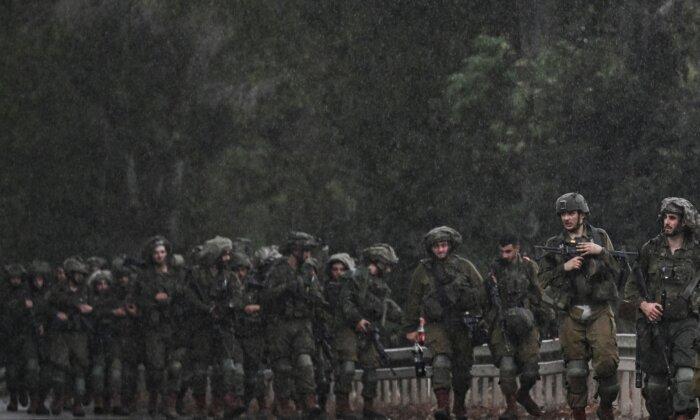A retired high-ranking CIA official doubts that Israel will engage in the full-scale ground invasion of Gaza that has seemed likely since the Hamas terrorist group’s devastating Oct. 7 land, sea, and air assault on the Jewish state.
Darrell Blocker told a crowd of about 100 people at an Atlanta synagogue on Oct. 12 that an invasion doesn’t make strategic sense for Israel. He said Israeli tanks won’t be able to get through or maneuver in Gaza’s crowded streets, now filled with building rubble from the bombing.
Also, Israel will pay too high a price diplomatically if they invade, he said.
“Strategically, it doesn’t make sense from a political or military standpoint,” Mr. Blocker told The Epoch Times after the event. “The only thing it’s going to do is add to the criticisms against the government.
“Surgical strikes have been what they’re good at. Now, launching an ‘82 war, [like] going into [Lebanon], that’s not going to be in Israel’s favor.
“It’s just not. And guess what? They [the Israel Defense Forces] can’t move around. I mean the streets are destroyed. The cities are destroyed. People are now pushed into a whole different posture. There’s booby traps.
“I think they’re going to lose a lot of people if they do a ground campaign. And they'll lose a lot of political goodwill.”
He was asked whether it’s politically viable for Prime Minister Benjamin Netanyahu’s government to not invade, given the savagery of the attacks, Israeli public consensus to destroy Hamas, and Mr. Netanyahu’s declaration that “they’re all dead men.”
“What does finishing Hamas mean?” he asked rhetorically. “Hamas is a philosophy.”

Mr. Blocker predicted that Israel would compile its list of top-ranking Hamas members, target them in Gaza, or mark them for assassination when they leave.
“They can’t stay in there forever,” he said.
Mr. Blocker acknowledged that leaving Hamas’s rank and file intact might be a problem in the future, allowing for the terror organization’s rebirth even if its leadership is decapitated. No Hamas member will be safe until Hamas changes its charter, which calls for an Islamic state throughout Israel, the West Bank, and Gaza, he said.
Following a stint as an Air Force intelligence analyst, he joined the CIA in 1990, around the time of the First Palestinian Intifada against Israel. He wrote about it in an essay included with his application to join the agency.
After a career that included positions such as deputy director of the Counterterrorism Center, chief of the Africa division, and chief of training at Camp Peary, Virginia, better known as “The Farm,” Mr. Blocker retired from the CIA in 2018. At his retirement, he was the most senior black officer in the directorate of operations.
He began studying Judaism in college and formally converted in 2017. He was awarded the agency’s Distinguished Career Intelligence Medal.
After the 2020 election, Mr. Blocker was on President Joe Biden’s shortlist to become CIA director, a position that ultimately went to William J. Burns. Since retiring, he has worked as chief operating officer for the intelligence advisory firm MOSAIC, as an ABC News commentator, and as a public speaker.
Taking questions from the audience at the synagogue in Atlanta’s Buckhead neighborhood, Mr. Blocker said he'd spent much of his career chasing terrorists.
Not seeing the attack coming wasn’t just an intelligence failure but “an all-government failure,” not only of Israel or the United States but of their “strong intelligence partners” in Egypt and Jordan, he said.
Mr. Blocker predicted that warning signs might emerge later, “little snippets of information,” as it happened after attacks such as 9/11 or Pearl Harbor.

Intelligence agencies deal with a torrent of information, threats that are “daily and imminent,” the vast majority of which prove false, according to Mr. Blocker.
“It took us 10 years to catch [Osama] Bin Laden, but we never stopped trying,” he said. Terrorists using “really good tradecraft,” staying off the grid, and passing information only by word of mouth, as Bin Laden did. That creates an intelligence challenge that “doesn’t have a technological answer to it.”
“Intelligence is not a panacea for protecting everything. ... The CIA can’t be everywhere.”
Discussing techniques for interrogating captured jihadis, he said listening to them is paramount. If they feel someone is hearing them, it can soften their resistance to talking.
Also key is spotting the ones who feel betrayed by the terror groups they once willingly joined, perhaps because “this is not what I thought it was. This is not the religion I was taught,” Mr. Blocker said, referring to captured jihadis.
Those prisoners can be flipped, he said. The interrogator doesn’t need to argue with them or try to change their minds; that won’t happen, he noted. But the interrogator can provide an ear.
“Some of those people who are in custody are going to be great sources of information, even if they did horrible things,” Mr. Blocker. “That’s the nature of being an intelligence officer. It’s not easy. It’s not for everyone.”
He says he has no doubt that Hamas had help from its terror sponsor, Iran.
“I’m saying this as a guy who’s been studying military and intelligence services since 1982,” Mr. Blocker said. “They had help.
“Hamas has never been capable to the level of what just happened this past week.
“The U.S. government [says] they can’t specifically and definitively say it was Iran. But I’m telling you, it was Iran.
“I’m sure I’m going to get flak about this from other folks, but Iran has been responsible for most of the proxies and most of the groups that have sprung up since 1979. And it all goes back to the Ayatollah [Khomeini, Iran’s revolutionary leader.]

“I would say from the complexity of how they came in and how they attacked, that the Quds Force, which is part of the Iranian Revolutionary Guard, had some influence if not direct involvement.”
He was careful to differentiate between groups. The leader of the Taliban, Mullah Omar, forbade beheading people, he said. The Palestinian Liberation Organization, for decades, had the destruction of Israel in its charter but rescinded it. The Palestinian Authority, which rules the West Bank, often cooperates in security matters with Israel and the United States.
Asked whether Hamas deliberately released videos of their savagery as psychological warfare, the retired CIA official said it was “more propaganda helpful in recruiting people to the cause. ISIS did this with notable success a decade ago.”
He urged people to avoid viewing such images on the internet and, at all costs, shield their children from them. Those who need to see what’s out there should set a time in the day, preferably early in the day—but never before bed—and ration the time they spend watching them.
“You don’t need these people’s images in your head,” Mr. Blocker said.
Some of the estimated 150 Israeli hostages will die, he flatly told the audience. But he expressed hopes that many will be rescued.
Middle Eastern terror groups have a long history of trading hostages to free their own people held prisoner by Israel and might do so here, according to Mr. Blocker.

Israel might face difficult choices if they have the option to rescue some group of hostages because doing so will endanger those still held.
“There’s going to be a lot of what we call ’moral algebra,'” Mr. Blocker said.
He said that despite a career chasing and fighting such people, he still doesn’t understand those who would inflict such pain on defenseless people.
“It’s difficult to deal with. I’ve spent my life chasing Al-Qaeda, chasing Al-Shabab, chasing Hamas,” he said.
“The level of killing that we’ve seen, I’ve only ever seen one time. ISIS in the 2014 to ‘16 timeframe. They were doing some of the most heinous things for longer than five days, in fact, for seven or eight years, and the world turned a blind eye to it.”
Mr. Blocker found it necessary to compartmentalize what he was exposed to, to “push through” and keep doing his work.
“I’ve learned to cry in the shower,” he said.







